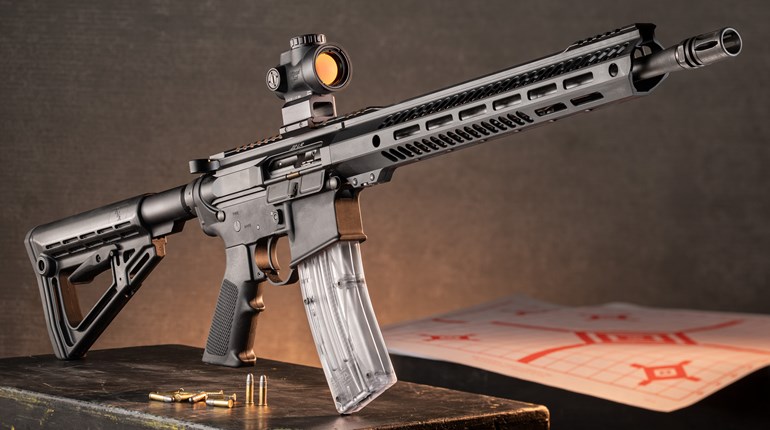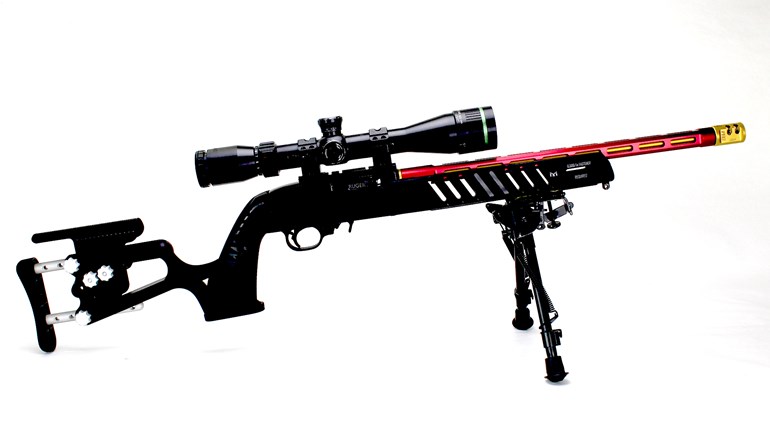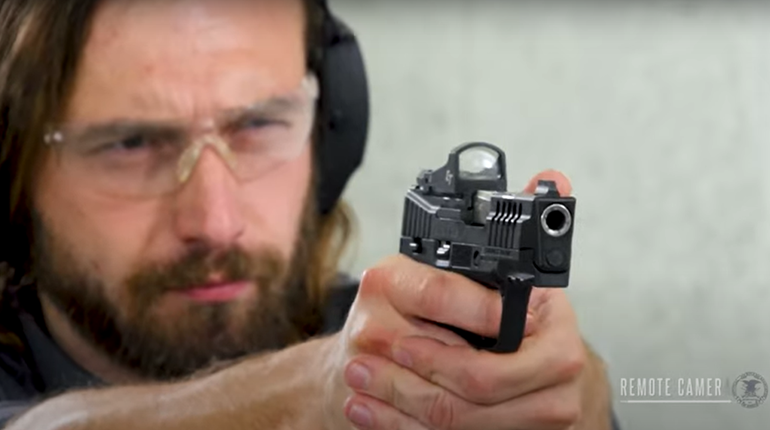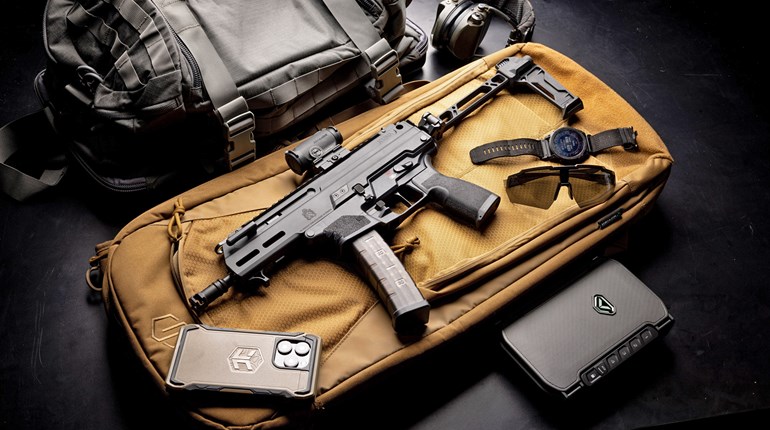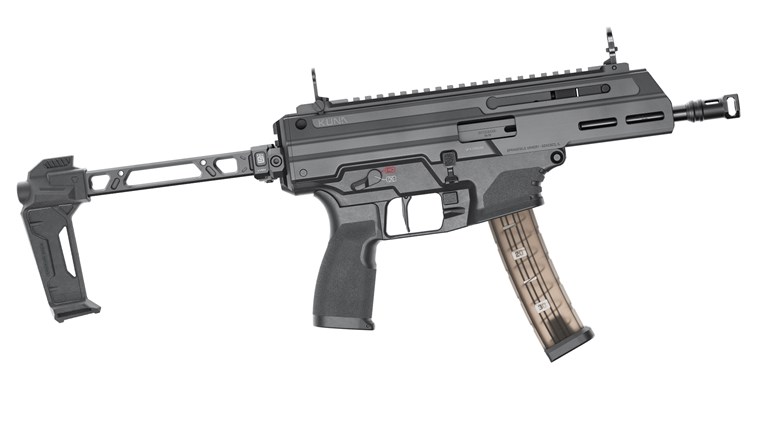
What’s better than shooting a comfortable, accurate handgun? Shooting it a lot. “More better,” yes? With rimfire ammunition widely available at last, the fun of plinking for pleasure made a comeback. With the help of the Kel-Tec CP33—Competition Pistol, 33-shot—we no longer have to pause to reload every 10 rounds.
This formidable-looking pistol is built around the innovative, flush-fitting, 33-round, quad-stack magazine. A newly patented design, it uses the recoil-spring guide rod as a cartridge-stack separator. The two streams of ammunition merge at the top for single-position feed. Loading is easy, with moderate spring tension, so that the thin brass of individual cartridges does not deform. The same size as the PMR30 magazine, the feeding device for the CP33 is transparent, skeletonized and uses the excess length for an integral feed ramp. While the heel-type magazine release isn’t fenced, loaded magazines do not drop free, preventing accidental removal. For rough field use, Tandemkross makes a “ranger” floorplate for PMR30 and CP33 magazines that “fences” the release to prevent inadvertent activation. An extended 50-shot magazine will be available later in 2019. The slide locks back on the last shot. A well-sculpted, milled slide stop/release lever can be depressed to chamber the first round of a new magazine.

Ever since Kel-Tec brought out the PMR30 in .22 Mag. in 2011, its fans asked for a .22 LR version of it to reduce the cost and the noise of recreational plinking. In late 2018, a group of gunwriters gathered at High Bar Homestead Ranch in Gillette, WY, to try new guns—the KS7 shotgun and CP33 rimfire pistol—in order to provide pre-production feedback. Several configurations of the CP33, with and without optics, plain and sound-suppressed, were shot extensively in all kinds of weather, including a snowstorm. To reduce the ammunition factor, all testing was done with CCI Mini Mags, one of the benchmarks for reliable rimfire cartridges. After many thousands of rounds shot for speed, accuracy and to test sustained fire capability, the CP33 emerged as a strong favorite for all who tried it. Feedback received was incorporated in the first production run, but the changes suggested were quite minor because the design had been in development a very long time, and because it shared a lot of functionality with the PMR30. At SHOT Show 2019, after a long and secretive media blackout to allow production to fill the initial demand, the CP33 was introduced to the public at large. At press time, it is already shipping to stores.
On the outside, it looks like a cross between the PMR30 and the CMR30 carbine, with the centrally located pistol grip and the substantial receiver overhand in the back. The pistol is 10.5 inches long, with 5.5 inches of that being barrel. It’s 3⁄4 inch longer than a conventional rimfire pistol with the same barrel length, but the CP33 unorthodox design accomplishes several important goals. The front sight is adjustable and incorporates a fiber-optic light tube, as does the rear. Sight radius is a respectable 9.5 inches. Both sight blades are textured against glare, and the rear is undercut slightly. The bolt can travel up to 5⁄16 of an inch past the feeding position, allowing reliability with subsonic and high-velocity ammunition. The 7.5 inches of Picatinny rail on top accommodates red-dot or magnified optics to make the most of the accurate barrel. Best of all, the balance of the pistol is so neutral that practical offhand accuracy is superb with minimal shooter effort. This neutral balance and excellent sights, green in front, red in the rear, make it a great training pistol for new shooters. The plastic grip frame connects to a smooth aluminum dustcover on the front. Both the rigid dustcover and the extruded-aluminum upper are pierced with M-Lok slots for accessories and barrel ventilation. The back of the grip frame has two solid rectangular eyelets for attaching a lanyard or a sling. With tension on the sling and a two-handed grip, the pistol can be held solidly. Trigger pull is advertised as 4 to 6 pounds, but on my sample broke cleanly at 3.3 pounds. While reset is almost the full length of travel, that doesn’t affect speed-shooting performance at all thanks to the fairly strong return spring. The bolt locks back on the last round.

The non-reciprocating, ambidextrous charging handle is placed at the back of the gun’s receiver in the manner of the Steyr TMP or AR-15. Made with production-grade 3D printing, it seals the receiver opening against any gas blowback toward the shooter. With the barrel threaded 1⁄2x28 tpi for a flash hider or a sound suppressor, the pistol is extremely silencer-friendly. Even with a suppressor attached, the CP33 retains its mostly neutral balance. Muzzle flash is minimal even with high-velocity ammunition. However, a compensator, such as those made by Kel-Tec or Tandemkross, is a useful accessory for rapid fire. The same neutral balance causes some muzzle rise, even with the forward grip location.

Fortunately, a rimfire compensator is not concussive but steadies the muzzle in place effectively. Combined with a wider, ledge-style Tandemkross safety lever and a forward “thumb pedal,” the CP33 in full competition trim stays on target even at several shots per second rapid fire. Fired more deliberately, the CP33 easily allows overlapping lead splash marks on steel at 25 yards using just the iron sights, and better than that with an optic. Using Eley ammunition and a 2X pistol scope, the CP33 can cloverleaf bullet holes at 25 and stay on a silhouette at 100 yards. Ammunition selection depends in part on the intended use, in part on how clean the gun is. A newly cleaned CP33 will run unplated lead subsonics and standard velocity just fine. After a couple hundred rounds with a sound suppressor or about 300 without, unplated bullets no longer chamber reliably. The bolt reciprocates less energetically, and so chambering becomes somewhat sluggish. CCI MiniMags recommended by Kel-Tec and also Aguila Super Extra high-velocity 40-grain plated ammunition continue to work up to about the 500-round mark. At that point, it’s time to clean the pistol. Fortunately, the disassembly is extremely simple, with a single push-pin separating the grip frame from the upper. The bolt, charging handle and the captive recoil spring come out of the back of the receiver with fingertip pressure. The pistol construction is super simple and well thought out. Internal rails stiffen the receiver and guide the bolt toward consistent in-battery position from shot to shot. The pistol has been unfailingly reliable with all kinds of ammunition, even in cold weather. From the 5.5-inch barrel, high-velocity 40-grain loads develop 1,050 to 1,100 fps, and 32- to 33-grain hyper-velocity loads in the 1,200 to 1,300 fps range—quite respectable for a pistol. Recoil in this 24-ounce pistol is nonexistent. Great balance and an ambi safety make it an easy pistol to shoot well with the weak hand, too. If you plan to shoot with bulky winter gloves on, or with sweaty hands in the heat, a Tandemkross ledge-style safety lever would be highly recommended. Otherwise, it’s too easy to bump the safety half-way to safe position, or for the thumb to slip off when disengaging. The wider safety gives the strong-hand thumb room to rest, similar to how competition 1911 or CZ safeties work. Called “competition pistol” by Kel-Tec, the CP33 can definitely work in that role, specialized more for the rapid-paced Rimfire Steel Challenge than for bullseye. Being light and weather-resistant, it can also be an excellent kit gun. A single 100-round box of CCI MiniMags fits perfectly into a CP33 with a chambered round and two spare magazines, 33+33+33+1—a very useful amount of ammunition for a wilderness hike. Unlike the diminutive .22 revolvers usually pressed into that role, the CP33 can be accurate and terminally effective on small game up to at least 50 yards. As a defensive tool, it is limited by the power and the reliability of rimfire ammunition but, as rimfire pistols go, the CP33 has been unusually reliable. In a pinch, 34 available shots remind us that sufficient quantity has a quality of its own. I showed the pistol to an arthritic 73-year-old woman who had difficulty cycling locked-breech .380 ACP pistols or pulling double-action revolver triggers. The CP33 presented ample surface for grasping the charging handle, and no possibility of getting pinched. It looks like a CP33 is in her future, as it is one of the few designs that can be operated with minimal strength applied, and was also the best balanced of the many handguns demonstrated. Like the CMR30, it has two small lanyard brackets at the back of the receiver. A two-handed grip with a third point of control supplied by a lanyard clipped on the belt produces a stable firing platform.

Even with the relatively long barrel, most .22 LR ammunition stays subsonic. Kel-Tec-recommended CCI MiniMags average 1,065 fps, so there’s little reason to use substantially weaker and usually more expensive standard- or low-velocity loads. For defense or hunting, CCI Velocitor, also 40 grain but optimized for shorter barrels, clocks in at just under 1,200 fps. That’s approaching slower .22 Mag. loads from the same length barrel. The CP33 advantage is in the much reduced noise and flash compared to .22 Mag. I conducted accuracy testing using the excellent Hi-Lux 4-MOA Tac-Dot, a small open-emitter sight with very effective forward-facing auto-exposure sensor. The pistol was supported on a sandbag, but the central location of the grip gives the CP33 less advantage from that than it would to a typical handgun with a conventionally placed grip. The CP33 excels in unsupported firing.

Accuracy was the same with and without a Gemtech sound suppressor. I suspect that cycling of subsonic ammunition was made more reliable with the extra back-pressure, at the cost of more rapid carbon fouling. The 4-MOA dot was easy to pick up, but a 2X pistol scope would have provided greater practical accuracy. Fortunately, the top of the receiver has enough room for the typical 8- to 9-inch long 2X pistol scope, and the objective lens would still be set back far enough to avoid exposure to the muzzle blast of an unsuppressed pistol.
What can be done to improve it? Depending on your hand size, you may find a slightly thicker backstrap desirable to bring the natural point-of-aim in line with the expectations. For people with medium and smaller hands, the CP33 points perfectly out of the box, but shooters with small hands must use a two-handed grip for better control. It’s a very fun pistol, reliable and impressively accurate. It’s a good thing Kel-Tec produced plenty of CP33s before announcing it. After some delays with the instruction manual, it finally started shipping. At an MSRP of $475 with two 33-round magazines, it’s not likely to stay on shelves for very long.












